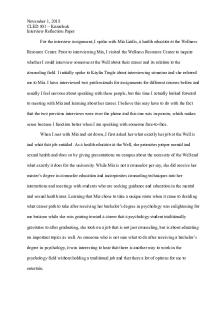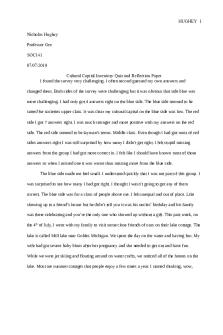Cultural Informant Project-Cultural Interview and Reflection PDF

| Title | Cultural Informant Project-Cultural Interview and Reflection |
|---|---|
| Course | Multicultural Counseling |
| Institution | Pepperdine University |
| Pages | 5 |
| File Size | 93.1 KB |
| File Type | |
| Total Downloads | 94 |
| Total Views | 153 |
Summary
interview and reflection essay...
Description
1
Cultural Informant Project: Cultural Interview and Reflection
Graduate School of Education and Psychology, Pepperdine University PSY 622: Multicultural Counseling
2 For this assignment, an interview was conducted with a representative of the culture discussed in the brief literature review. The interviewee was a 26-year-old Latina woman of Salvadoran descent named Vanessa. Her highest level of education is a Bachelor's degree, and she describes socioeconomic status as roughly middle class. Her parents are both immigrants from El Salvador and have lived in the United States for over three decades. Vanessa is the oldest of three siblings, all born in the United States. In the interview, she shed light on topics including cultural values, mental health utilization, and stigma. Her commentary was very much aligned with the literature that was evaluated before completing the interview. Vanessa and I began by talking about cultural values. Upon being asked what she believes is most valued in culture, her immediate response was family; this was followed by quite a bit of discussion about the familismo value. Vanessa described having a very close relationship with her parents. She said that Latino parents tend to be very involved in their children's lives, not just during childhood but also in adulthood. Vanessa also describes her parents as role models and referents, whom she looks to for emotional, social, and psychological support, all of which have been discussed in research (Villatoro et al., 2014; Barrera & Longoria, 2018). Throughout her life, she has been inspired by them and strived to pay them back for their hard work and sacrifices by creating a successful life for herself. We discussed the relationship between her culture/community and mental health, beginning with mental health utilization. Vanessa stated that she believed mental health utilization rates were very low in her culture, as evident from the literature (Chang & Biegel, 2018). She then explained that she believes many factors play into this, including financial obstacles, lack of understanding, and stigma. She said that she assumes utilization rates are
3 higher in younger Latinos. However, older generations, particularly those who grew up "back home," would be less likely to seek mental health services. We went over the myriad of factors that contribute to the significant underutilization of services. First, we discussed stigma. Barrera and Longoria (2018) mentioned that many Latino communities associate mental illness with being "crazy," which Vanessa confirmed. In addition to stigma, she believes that this misconception causes many people to believe they do not need mental health services because they associate the "crazy" people with dangerous behavior or low levels of functioning. Therefore, one who can function normally cannot even imagine how they could benefit from mental health services. Vanessa also explained how Latinos utilize alternative services to help with mental health challenges. Villatoro and colleagues (2014) described that a majority of Latinos utilize alternative or "informal" services, such as religious leaders or spiritual healers. Vanessa described how significant religion and spirituality are to her culture and how that influences their help-seeking behaviors. With religion being so profoundly ingrained and such a significant part of daily life, Vanessa believes Latinos tend to turn to the church when they feel emotionally or psychologically distressed. She also talked about how Latinos may misinterpret psychological distress and psychiatric symptoms with a lack of knowledge on mental health. Barrera and Longoria (2018) describe a variety of phenomena reported by Latinos that have similar symptoms to mental disorders, including susto (shock), nervios (anxiety), and miedo (fear). Often, Latinos who experience these phenomena report somatic complaints. Vanessa claims that such things are frequently misinterpreted as physical problems, such as stomach issues when experiencing anxiety symptoms. As a result, she says, Latinos opt for natural or herbal remedies,
4 usually from spiritual healers. It is estimated that up to 44% of Latinos have sought help from spiritual healers for general and mental health concerns (Barrera & Longoria, 2018). Vanessa confirms that this is a common occurrence and mentions her own family's experience, such as using various herbal supplements and teas for anxiety symptoms, stomach issues, menstrual cramps, and various physical and psychiatric symptoms. This interview was a very enlightening and educational experience. Talking to someone from the culture that I had studied gave much insight that both complemented and went beyond what the literature was able to show. The conversation flowed easily and comfortably, and I also learned that there were many similarities between Vanessa's culture and my own regarding cultural values and attitudes about mental health. The most significant implication for treatment that I would say I got out of this experience was the importance of cultural competence. I can see how easily clinicians and medical professionals would misdiagnose, under-diagnose, or overdiagnose certain psychiatric disorders if they were not familiar with the culture. For example, a medical or mental health professional who is not culturally competent could misdiagnose anxiety disorders for physical conditions. Overall, it was a very educational experience.
5 References Barrera, I., & Longoria, D. (2018). Examining cultural mental health care barriers among Latinos. CLEARvoz Journal, 4(1). Chang, C. W., & Biegel, D. E. (2018). Factors affecting mental health service utilization among Latino Americans with mental health issues. Journal of Mental Health, 27(6), 552-559. Keyes, K. M., Martins, S. S., Hatzenbuehler, M. L., Blanco, C., Bates, L. M., & Hasin, D. S. (2012). Mental health service utilization for psychiatric disorders among Latinos living in the United States: the role of ethnic subgroup, ethnic identity, and language/social preferences. Social psychiatry and psychiatric epidemiology, 47(3), 383-394. Ortiz, F. A. (2020). Self-actualization in the Latino/Hispanic culture. Journal of Humanistic Psychology, 60(3), 418-435. Varela, R. E., Niditch, L. A., Hensley-Maloney, L., Moore, K. W., Creveling, C. C., & Jones, K. M. (2019). Culture specific influences on anxiety in Latino youth. In Child & Youth Care Forum (Vol. 48, No. 1, pp. 1-17). Springer US....
Similar Free PDFs

Interview Reflection Paper
- 4 Pages

Evento Cultural Reflection
- 3 Pages

Reflection on the mock interview
- 3 Pages
Popular Institutions
- Tinajero National High School - Annex
- Politeknik Caltex Riau
- Yokohama City University
- SGT University
- University of Al-Qadisiyah
- Divine Word College of Vigan
- Techniek College Rotterdam
- Universidade de Santiago
- Universiti Teknologi MARA Cawangan Johor Kampus Pasir Gudang
- Poltekkes Kemenkes Yogyakarta
- Baguio City National High School
- Colegio san marcos
- preparatoria uno
- Centro de Bachillerato Tecnológico Industrial y de Servicios No. 107
- Dalian Maritime University
- Quang Trung Secondary School
- Colegio Tecnológico en Informática
- Corporación Regional de Educación Superior
- Grupo CEDVA
- Dar Al Uloom University
- Centro de Estudios Preuniversitarios de la Universidad Nacional de Ingeniería
- 上智大学
- Aakash International School, Nuna Majara
- San Felipe Neri Catholic School
- Kang Chiao International School - New Taipei City
- Misamis Occidental National High School
- Institución Educativa Escuela Normal Juan Ladrilleros
- Kolehiyo ng Pantukan
- Batanes State College
- Instituto Continental
- Sekolah Menengah Kejuruan Kesehatan Kaltara (Tarakan)
- Colegio de La Inmaculada Concepcion - Cebu












